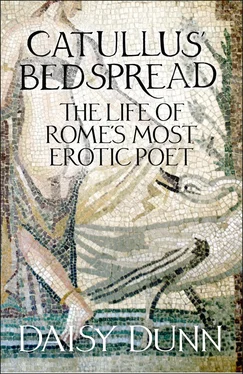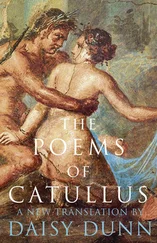Dirt tended to splash against this strip of purple, which proclaimed his status – ‘equestrian’ – to passers-by. They were descended from the cavalry, the equestrians, but less likely by now to be seen on a horse than in a forum, ensuring that they still satisfied the 400,000- sesterce wealth qualification that bought them membership of the elite order. Senators wore thicker purple stripes on their togas, and had at least a million sesterces each, but Catullus knew that his stripe made him more important than ordinary plebeians, who had no purple at all.
Catullus had put on the adult toga at the age of sixteen and indulged in so much sex, and so much poetry – ‘joys which your sweet love encouraged’ he once reminded his brother – that he remained forever nostalgic for those happy, carefree days. He never wrote of their mother, as he did of the mothers of friends: 6she might have died some years before her son enjoyed this ‘pleasant spring’:
From the time the pure toga was first put upon me,
When the bloom of my youth enjoyed its pleasant spring,
I sported hard enough. I was no stranger to the goddess
Who mixes sweet bitterness with love’s woe
(Poem 68)
As he pottered around his old home to the sound of slaves clattering plates – a sign that his father’s dinner was coming to an end – Catullus looked back on his youngest days. He remembered his first experiences of love and verse, his life’s spring, as well as the moment that presaged the change in season, the moment he decided to leave Verona to pursue a career as a poet in Rome.
In 62 BC a carriage had pulled into Cisalpine Gaul from which there disembarked a man in his early forties – a brother-in-law of Pompey the Great, Metellus Celer. He had recently completed a senior magistracy at Rome, the praetorship, and been intent on achieving the consulship before the decade was out. His appointment to a new post, governor of Cisalpine Gaul, had come about in return for his help in quelling a terrifying conspiracy in Rome.
A disaffected young patrician politician, Catiline, a former ally of the erstwhile dictator Sulla, had planned with his supporters to murder the most senior members of the Roman Senate, ravage the city with fire, and fling open Rome’s gates to an army of several thousand that had gathered in the north. 7Catiline’s campaign for the consulship of 63 BC had been unsuccessful. Cicero, who had been elected to one of the two seats, foiled his conspiracy and took charge of a full-scale security operation. Determined to save his beloved Republic from extinction, he rounded up some of the chief conspirators – who included rogue senators – and the Senate agreed to put them to death without trial as enemies of the state. Metellus Celer helped Cicero by blocking the plotters’ rampage.
Cicero had hoped to win praise for his swift response. Instead, Metellus Celer’s brother, a feisty tribune in Rome, vetoed him from delivering his parting address from his consulship, saying that he should not have had the conspirators executed without trial. Technically, he was right. 8The incident was still haunting Cicero to this day.
Catullus moved to Rome probably soon after the conspiracy. Whether it was in Verona that he had first met Metellus Celer, or in the great city itself, that moment had proved a turning point. For little though Catullus could have anticipated it upon their first meeting, Metellus Celer would become something of an obstacle for him. In recent years Catullus had fallen passionately in love with his wife.
Конец ознакомительного фрагмента.
Текст предоставлен ООО «ЛитРес».
Прочитайте эту книгу целиком, купив полную легальную версию на ЛитРес.
Безопасно оплатить книгу можно банковской картой Visa, MasterCard, Maestro, со счета мобильного телефона, с платежного терминала, в салоне МТС или Связной, через PayPal, WebMoney, Яндекс.Деньги, QIWI Кошелек, бонусными картами или другим удобным Вам способом.











